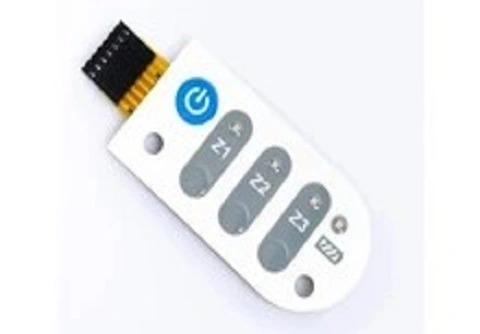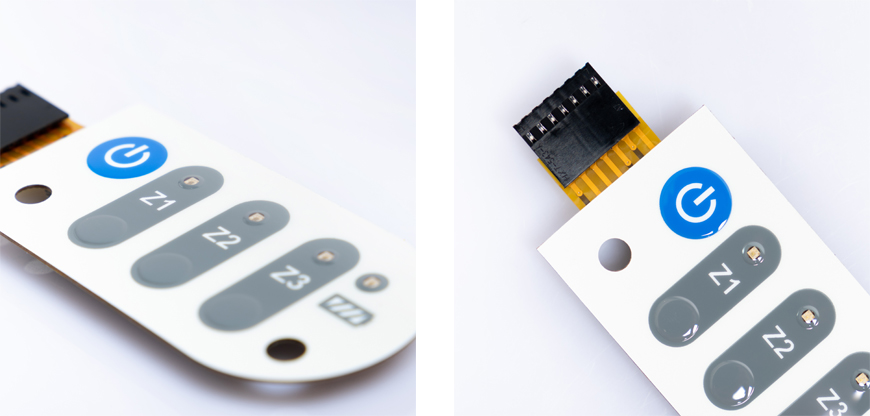
In today's fast-paced world, user interface technology has made tremendous strides in enhancing user experiences across various electronic devices. One of the remarkable innovations in this domain is the Flexible Printed Circuit (FPC) OEM Membrane Switch. In this article, we'll delve into the intricacies of FPC OEM membrane switches, exploring their construction, applications, advantages, and why they are revolutionizing user interfaces.

FPC (Flexible Printed Circuit) OEM Membrane Switches are revolutionizing the way users interact with electronic devices. These switches are made from flexible materials, allowing them to be thin, lightweight, and durable. They offer a sleek and reliable solution for a variety of applications, providing seamless integration into modern electronic devices. Their flexibility makes them ideal for use in products where space and weight are critical factors, while their durability ensures long-term functionality even under harsh conditions.
FPC OEM Membrane Switches operate based on a multi-layer construction of flexible materials, such as polyester or polyimide. These layers are printed with conductive traces that are separated by insulating layers, typically made of flexible substrates. When a user presses a specific area of the membrane switch, the pressure causes the conductive layers to come into contact with each other, thus completing an electrical circuit and registering the user input. The flexible nature of the membrane allows the switch to be highly responsive and durable, making it an excellent choice for devices requiring consistent performance over time.
The versatility of FPC OEM Membrane Switches makes them an ideal solution for a wide range of industries and applications. Some notable examples include:
Medical Devices: These switches are used in medical equipment where precision and reliability are critical. They can be found in devices like blood glucose monitors, infusion pumps, and diagnostic equipment.
Industrial Control Panels: FPC OEM Membrane Switches are commonly used in industrial settings, where durability and resistance to harsh environments (such as temperature fluctuations, moisture, and chemicals) are essential.
Automotive Interfaces: In the automotive industry, these switches are used for controlling features like climate settings, lighting, and entertainment systems. Their slim profile allows them to fit seamlessly into dashboards and other tight spaces.
Consumer Electronics: Many consumer electronics, such as smartphones, home appliances, gaming consoles, and remote controls, integrate FPC OEM Membrane Switches for their ease of use and aesthetic appeal.
Home Appliances: These switches can be found in microwaves, washing machines, coffee makers, and other household devices, providing a reliable, user-friendly interface.
FPC OEM Membrane Switches offer several key advantages that make them a preferred choice for manufacturers:
Low Profile and Compact Design: The slim design of FPC OEM Membrane Switches allows for easy integration into compact electronic devices, offering a sleek, modern appearance without sacrificing functionality.
Resistance to Environmental Factors: FPC Membrane Switches are highly resistant to factors such as moisture, dust, temperature extremes, and chemicals, making them well-suited for use in demanding environments.
Easy Customization: The design and functionality of FPC OEM Membrane Switches can be easily customized to meet specific product requirements, including various button shapes, sizes, and configurations.
Cost-Effectiveness: Due to their simple construction and efficient manufacturing process, FPC OEM Membrane Switches are generally more affordable than mechanical switches, helping to reduce overall production costs.
Long Lifespan: These switches offer a long operational lifespan, typically with a high number of cycles (millions of presses), making them reliable over time in devices that require frequent user interaction.
FPC OEM Membrane Switches have truly become a game-changer in modern device design due to their flexibility, durability, and performance. Their ability to withstand harsh conditions—such as exposure to moisture, extreme temperatures, and rough handling—makes them an ideal choice for manufacturers looking for long-lasting, reliable interfaces. Additionally, their low profile and customization options provide manufacturers with the flexibility to design aesthetically pleasing, functional, and compact devices. Whether used in medical devices, industrial equipment, or consumer electronics, FPC OEM Membrane Switches are setting new standards for user interface technology and are a crucial component in the next generation of electronic devices.
Q: What is the lifespan of an FPC OEM Membrane Switch?
A: The lifespan of an FPC OEM Membrane Switch can vary depending on usage and environmental factors but typically ranges from 1 to 5 million actuations.
Q: Can FPC OEM Membrane Switches be used in outdoor applications?
A: Yes, FPC OEM Membrane Switches can be designed to withstand outdoor conditions, provided they are properly sealed and protected.
Q: Are FPC OEM Membrane Switches compatible with touchscreens?
A: Yes, FPC OEM Membrane Switches can be integrated with touchscreens to provide a seamless user interface.
Q: What industries benefit the most from FPC OEM Membrane Switches?
A: Industries such as medical, automotive, and industrial control panels benefit significantly from the reliability and customization options of FPC OEM Membrane Switches.
Q: How can I ensure the quality of FPC OEM Membrane Switches in my product design?
A: To ensure quality, collaborate with experienced manufacturers and adhere to industry standards during the design and manufacturing process.